Rapid change of Shenzhen documented by correspondent with photos
Xinhua
1602807759000
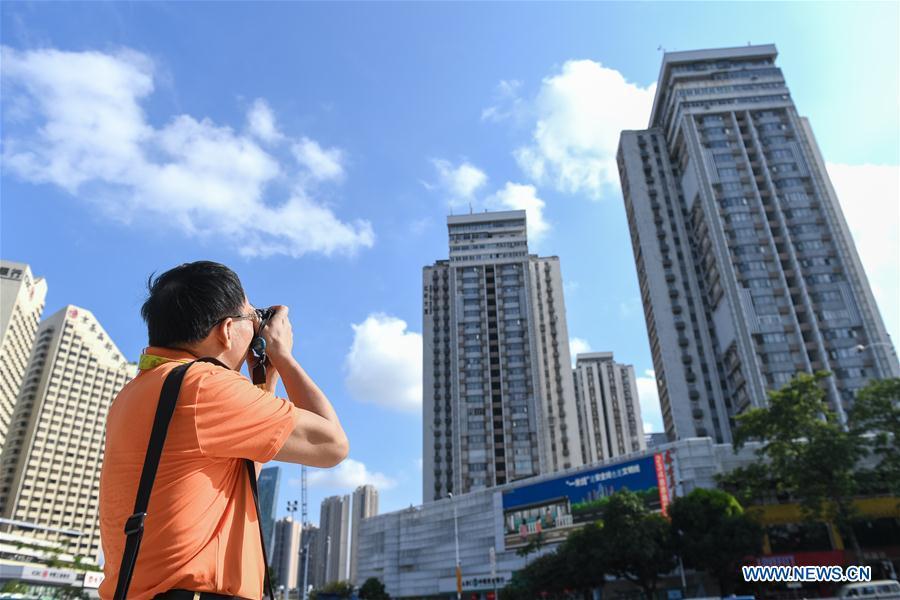
Yang Hongxiang takes photos of the Hongling Mansion in Shenzhen, south China's Guangdong Province, Sept. 22, 2020. Yang had worked as a military correspondent with the first combat engineers who pioneered the construction of the Shenzhen Special Economic Zone (SEZ). With photos and stories, he documented the rapid change of Shenzhen -- high-rise buildings mushrooming from barren lands, tarmacked avenues replacing dirt roads, public facilities such as museum, theater and airport rising from scratch. "Forty years ago I was recording this city and now I'm building it," says Yang, who owns an urban development business. "As a resident of Shenzhen, I've witnessed how it burgeoned and I truly take pride in the achievements we made." (Photos: Xinhua)
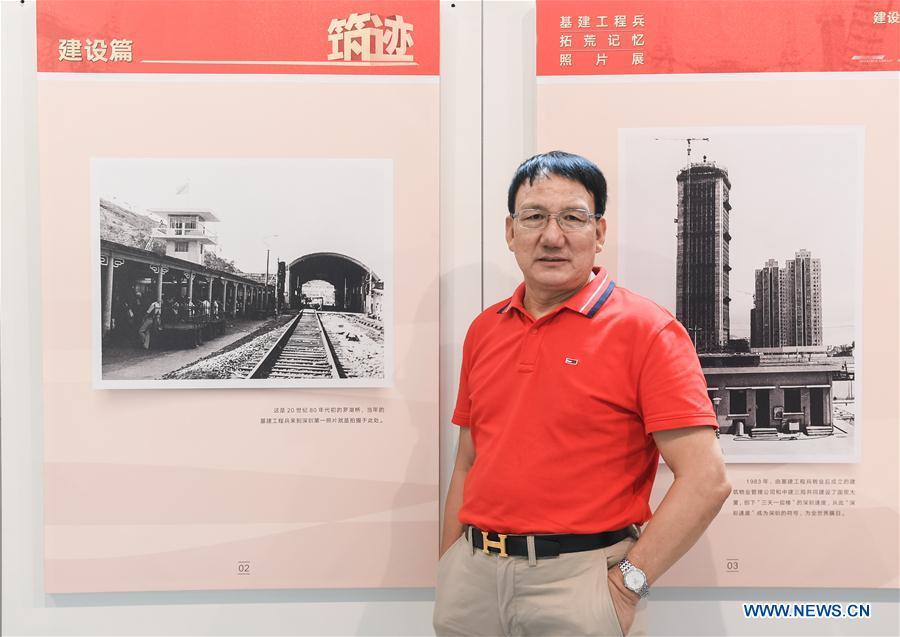
Former military correspondent Yang Hongxiang poses during a photo exhibition documenting how combat engineer corps helped build the infrastructure of the Shenzhen Special Economic Zone (SEZ) in the early 1980s at the library of Shenzhen University in Shenzhen, south China's Guangdong Province, Sept. 22, 2020. Yang had worked as a military correspondent with the first combat engineers who pioneered the construction of the Shenzhen SEZ. With photos and stories, he documented the rapid change of Shenzhen -- high-rise buildings mushrooming from barren lands, tarmacked avenues replacing dirt roads, public facilities such as museum, theater and airport rising from scratch. "Forty years ago I was recording this city and now I'm building it," says Yang, who owns an urban development business. "As a resident of Shenzhen, I've witnessed how it burgeoned and I truly take pride in the achievements we made."
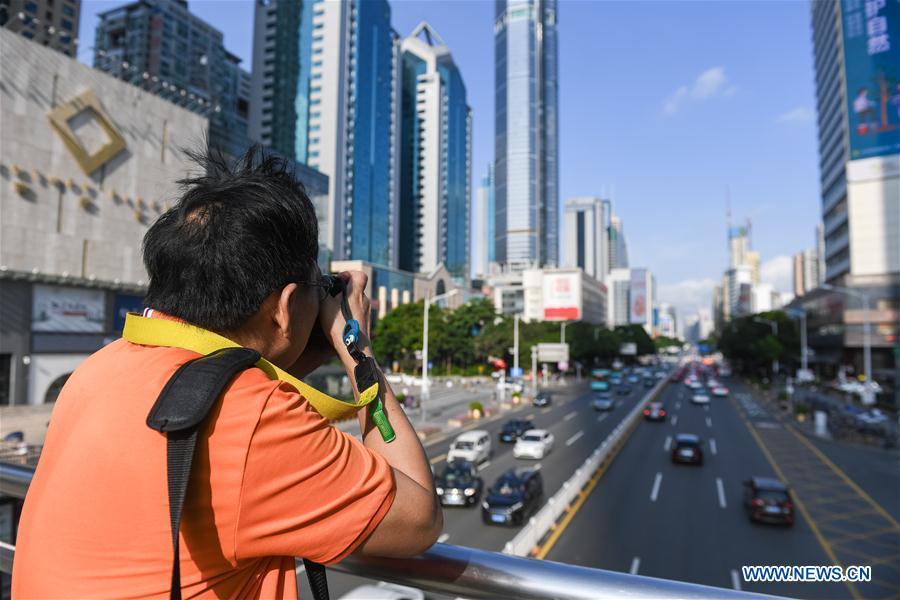
Yang Hongxiang takes photos of a main street in Shenzhen, south China's Guangdong Province, Sept. 22, 2020. Yang had worked as a military correspondent with the first combat engineers who pioneered the construction of the Shenzhen Special Economic Zone (SEZ). With photos and stories, he documented the rapid change of Shenzhen -- high-rise buildings mushrooming from barren lands, tarmacked avenues replacing dirt roads, public facilities such as museum, theater and airport rising from scratch. "Forty years ago I was recording this city and now I'm building it," says Yang, who owns an urban development business. "As a resident of Shenzhen, I've witnessed how it burgeoned and I truly take pride in the achievements we made."
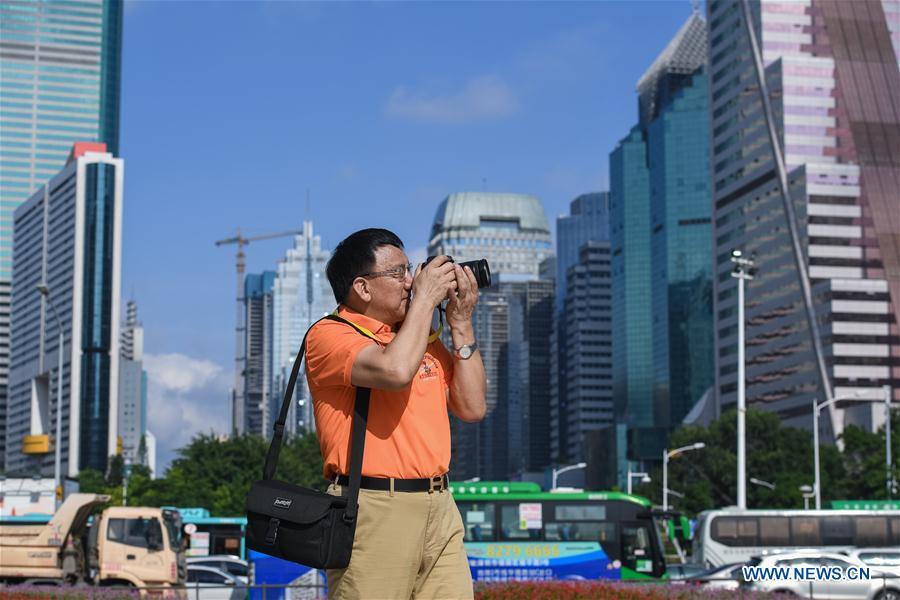
Yang Hongxiang takes street photos in Shenzhen, south China's Guangdong Province, Sept. 22, 2020. Yang had worked as a military correspondent with the first combat engineers who pioneered the construction of the Shenzhen Special Economic Zone (SEZ). With photos and stories, he documented the rapid change of Shenzhen -- high-rise buildings mushrooming from barren lands, tarmacked avenues replacing dirt roads, public facilities such as museum, theater and airport rising from scratch. "Forty years ago I was recording this city and now I'm building it," says Yang, who owns an urban development business. "As a resident of Shenzhen, I've witnessed how it burgeoned and I truly take pride in the achievements we made."
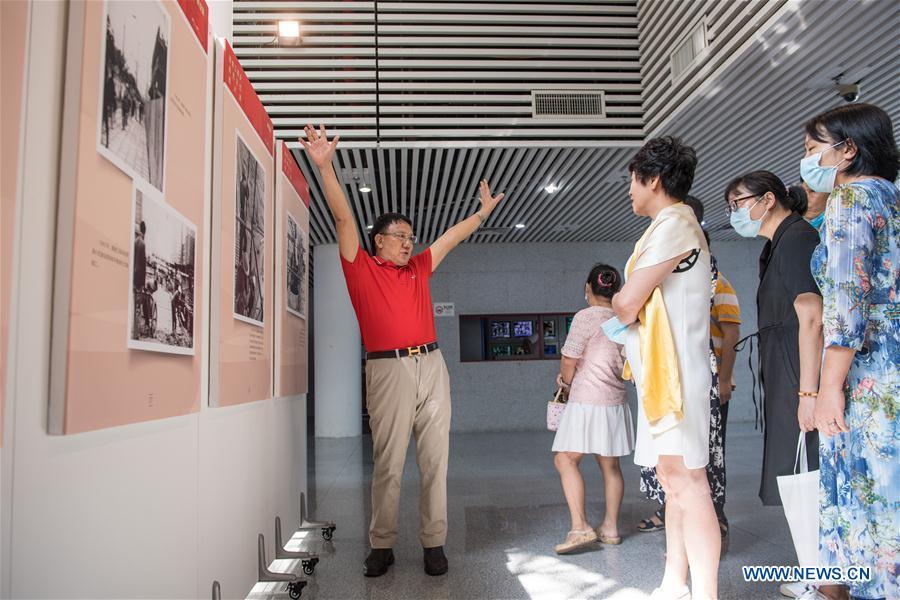
Former military correspondent Yang Hongxiang shares his experience documenting how combat engineer corps helped build the infrastructure of the Shenzhen Special Economic Zone (SEZ) in the early 1980s during a photo exhibition held at the library of Shenzhen University in Shenzhen, south China's Guangdong Province, Sept. 22, 2020. Yang had worked as a military correspondent with the first combat engineers who pioneered the construction of the Shenzhen SEZ. With photos and stories, he documented the rapid change of Shenzhen -- high-rise buildings mushrooming from barren lands, tarmacked avenues replacing dirt roads, public facilities such as museum, theater and airport rising from scratch. "Forty years ago I was recording this city and now I'm building it," says Yang, who owns an urban development business. "As a resident of Shenzhen, I've witnessed how it burgeoned and I truly take pride in the achievements we made."
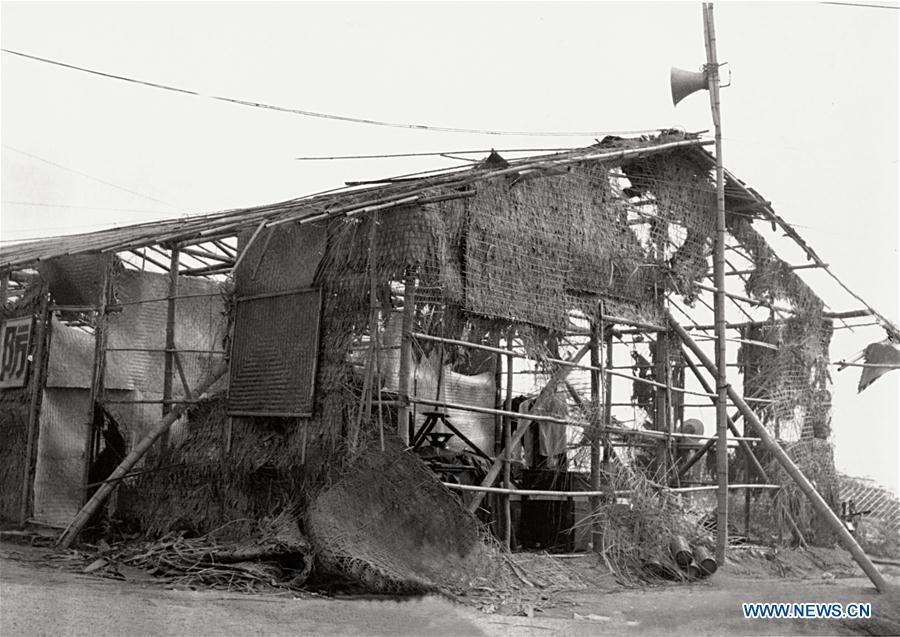
This photo taken by former military correspondent Yang Hongxiang on Sept. 9, 1983 shows a typhoon-battered barrack of combat engineers in Shenzhen, south China's Guangdong Province. The photo is part of an exhibition of Yang's photography works held at the library of Shenzhen University documenting how combat engineer corps helped build the infrastructure of the Shenzhen Special Economic Zone (SEZ). Yang had worked as a military correspondent with the first combat engineers who pioneered the construction of the Shenzhen SEZ. With photos and stories, he documented the rapid change of Shenzhen -- high-rise buildings mushrooming from barren lands, tarmacked avenues replacing dirt roads, public facilities such as museum, theater and airport rising from scratch. "Forty years ago I was recording this city and now I'm building it," says Yang, who owns an urban development business. "As a resident of Shenzhen, I've witnessed how it burgeoned and I truly take pride in the achievements we made."
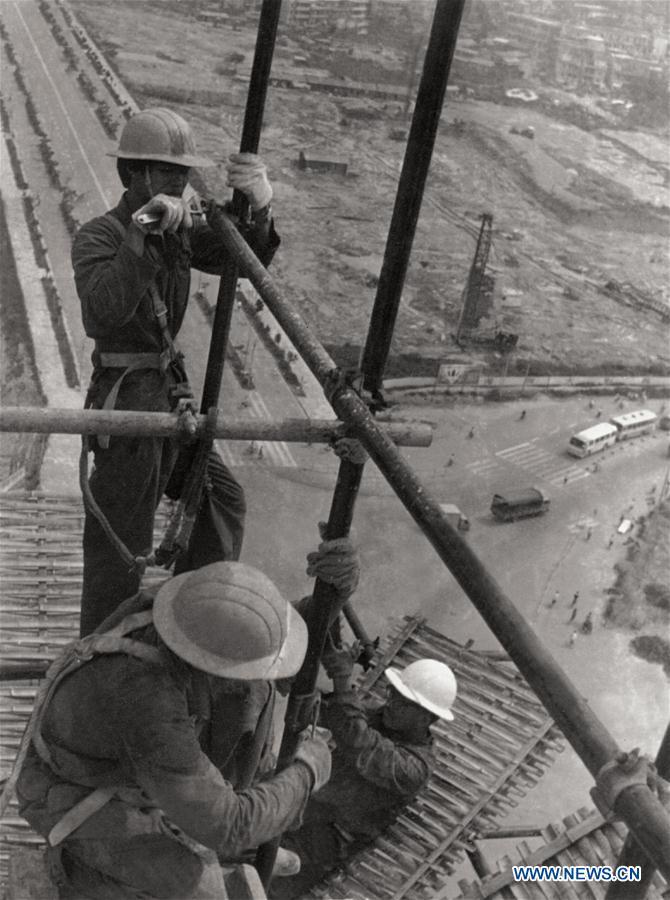
This photo taken by Yang Hongxiang in October 1983 shows people building the Hongling Mansion in Shenzhen, south China's Guangdong Province. The photo is part of an exhibition of Yang's photography works held at the library of Shenzhen University documenting how combat engineer corps helped build the infrastructure of the Shenzhen Special Economic Zone (SEZ). Yang had worked as a military correspondent with the first combat engineers who pioneered the construction of the Shenzhen SEZ. With photos and stories, he documented the rapid change of Shenzhen -- high-rise buildings mushrooming from barren lands, tarmacked avenues replacing dirt roads, public facilities such as museum, theater and airport rising from scratch. "Forty years ago I was recording this city and now I'm building it," says Yang, who owns an urban development business. "As a resident of Shenzhen, I've witnessed how it burgeoned and I truly take pride in the achievements we made."
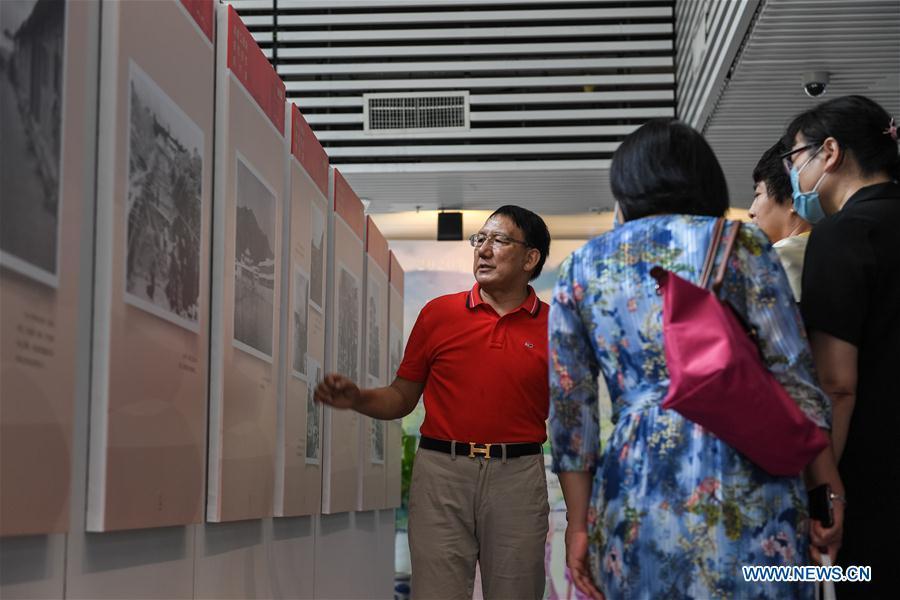
Former military correspondent Yang Hongxiang shares his experience documenting how combat engineer corps helped build the infrastructure of the Shenzhen Special Economic Zone (SEZ) in the early 1980s during a photo exhibition held at the library of Shenzhen University in Shenzhen, south China's Guangdong Province, Sept. 22, 2020. Yang had worked as a military correspondent with the first combat engineers who pioneered the construction of the Shenzhen SEZ. With photos and stories, he documented the rapid change of Shenzhen -- high-rise buildings mushrooming from barren lands, tarmacked avenues replacing dirt roads, public facilities such as museum, theater and airport rising from scratch. "Forty years ago I was recording this city and now I'm building it," says Yang, who owns an urban development business. "As a resident of Shenzhen, I've witnessed how it burgeoned and I truly take pride in the achievements we made."
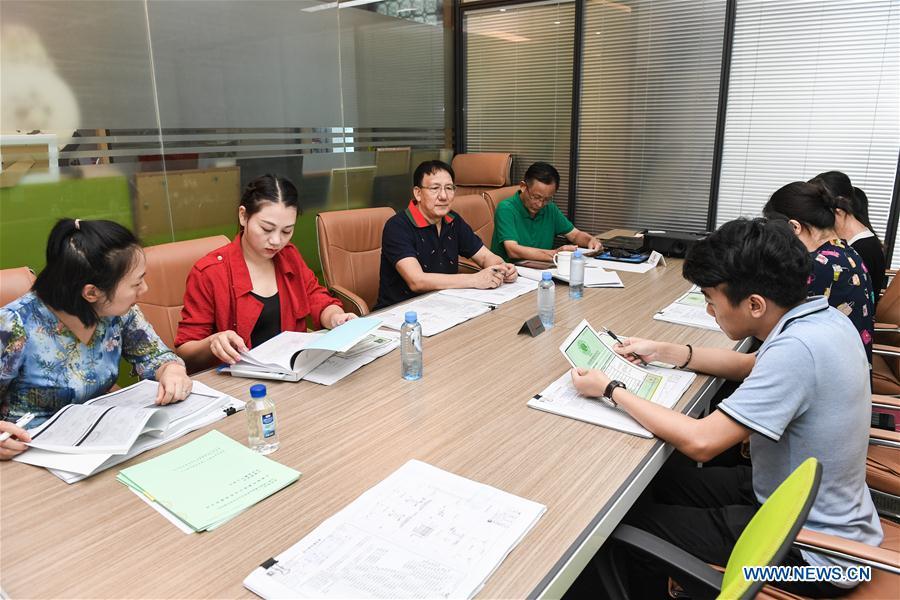
Yang Hongxiang (3rd L) discusses green building certification with colleagues at his company in Shenzhen, south China's Guangdong Province, Sept. 22, 2020. Yang had worked as a military correspondent with the first combat engineers who pioneered the construction of the Shenzhen Special Economic Zone (SEZ). With photos and stories, he documented the rapid change of Shenzhen -- high-rise buildings mushrooming from barren lands, tarmacked avenues replacing dirt roads, public facilities such as museum, theater and airport rising from scratch. "Forty years ago I was recording this city and now I'm building it," says Yang, who owns an urban development business. "As a resident of Shenzhen, I've witnessed how it burgeoned and I truly take pride in the achievements we made."
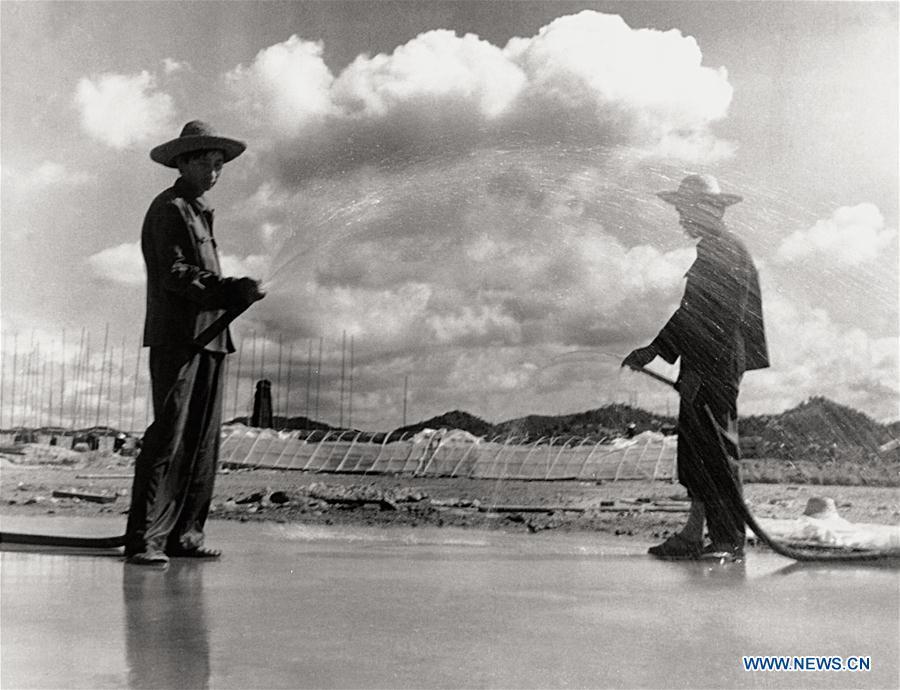
This photo taken by former military correspondent Yang Hongxiang in 1983 shows combat engineers maintaining a heliport in Shenzhen, south China's Guangdong Province. The photo is part of an exhibition of Yang's photography works held at the library of Shenzhen University documenting how combat engineer corps helped build the infrastructure of the Shenzhen Special Economic Zone (SEZ). Yang had worked as a military correspondent with the first combat engineers who pioneered the construction of the Shenzhen SEZ. With photos and stories, he documented the rapid change of Shenzhen -- high-rise buildings mushrooming from barren lands, tarmacked avenues replacing dirt roads, public facilities such as museum, theater and airport rising from scratch. "Forty years ago I was recording this city and now I'm building it," says Yang, who owns an urban development business. "As a resident of Shenzhen, I've witnessed how it burgeoned and I truly take pride in the achievements we made."
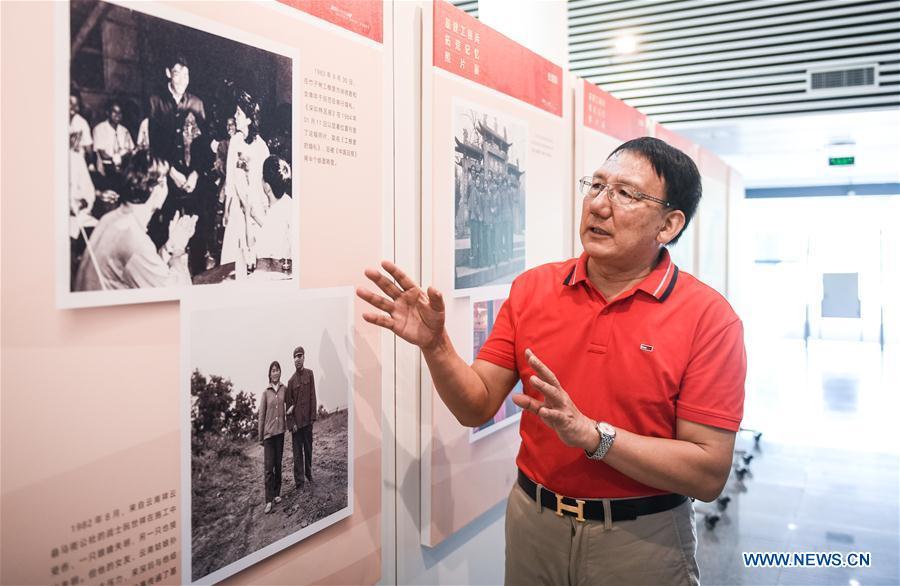
Former military correspondent Yang Hongxiang shares his experience documenting how combat engineer corps helped build the infrastructure of the Shenzhen Special Economic Zone (SEZ) in the early 1980s during a photo exhibition held at the library of Shenzhen University in Shenzhen, south China's Guangdong Province, Sept. 22, 2020. Yang had worked as a military correspondent with the first combat engineers who pioneered the construction of the Shenzhen SEZ. With photos and stories, he documented the rapid change of Shenzhen -- high-rise buildings mushrooming from barren lands, tarmacked avenues replacing dirt roads, public facilities such as museum, theater and airport rising from scratch. "Forty years ago I was recording this city and now I'm building it," says Yang, who owns an urban development business. "As a resident of Shenzhen, I've witnessed how it burgeoned and I truly take pride in the achievements we made." (Xinhua/Mao Siqian)
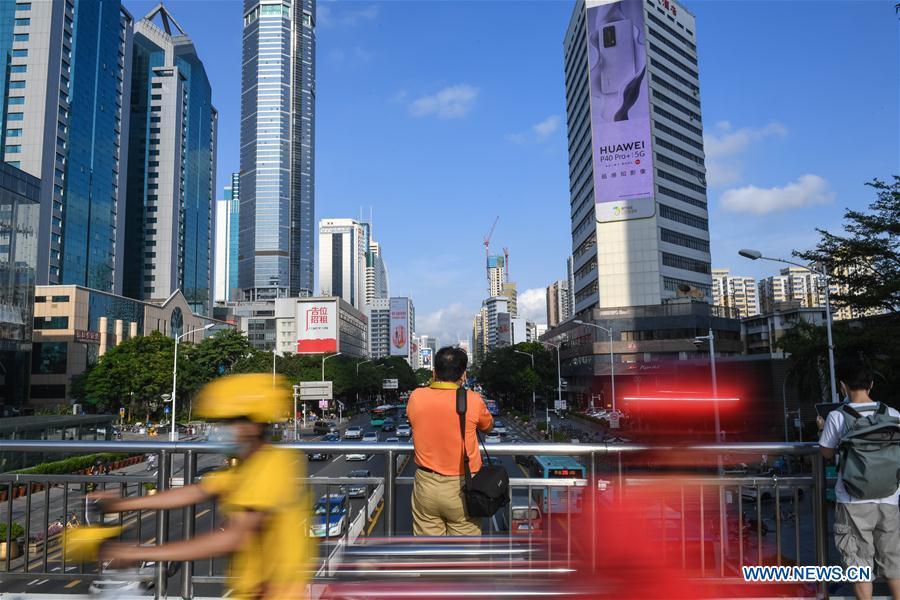
Yang Hongxiang takes photos of a main street in Shenzhen, south China's Guangdong Province, Sept. 22, 2020. Yang had worked as a military correspondent with the first combat engineers who pioneered the construction of the Shenzhen Special Economic Zone (SEZ). With photos and stories, he documented the rapid change of Shenzhen -- high-rise buildings mushrooming from barren lands, tarmacked avenues replacing dirt roads, public facilities such as museum, theater and airport rising from scratch. "Forty years ago I was recording this city and now I'm building it," says Yang, who owns an urban development business. "As a resident of Shenzhen, I've witnessed how it burgeoned and I truly take pride in the achievements we made."
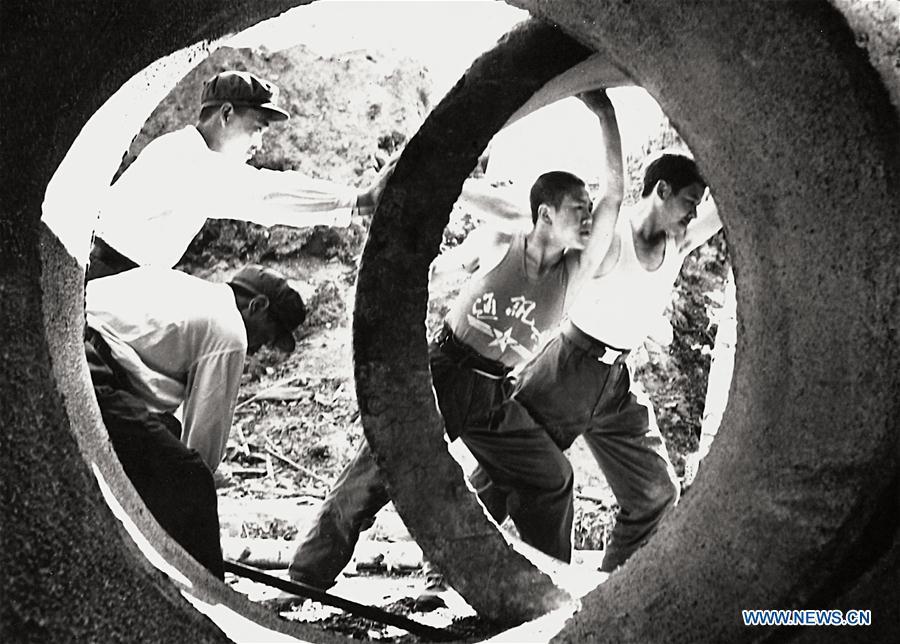
This photo taken by former military correspondent Yang Hongxiang in 1983 shows combat engineers rolling sewage pipes in Shenzhen, south China's Guangdong Province. The photo is part of an exhibition of Yang's photography works held at the library of Shenzhen University documenting how combat engineer corps helped build the infrastructure of the Shenzhen Special Economic Zone (SEZ). Yang had worked as a military correspondent with the first combat engineers who pioneered the construction of the Shenzhen SEZ. With photos and stories, he documented the rapid change of Shenzhen -- high-rise buildings mushrooming from barren lands, tarmacked avenues replacing dirt roads, public facilities such as museum, theater and airport rising from scratch. "Forty years ago I was recording this city and now I'm building it," says Yang, who owns an urban development business. "As a resident of Shenzhen, I've witnessed how it burgeoned and I truly take pride in the achievements we made."


